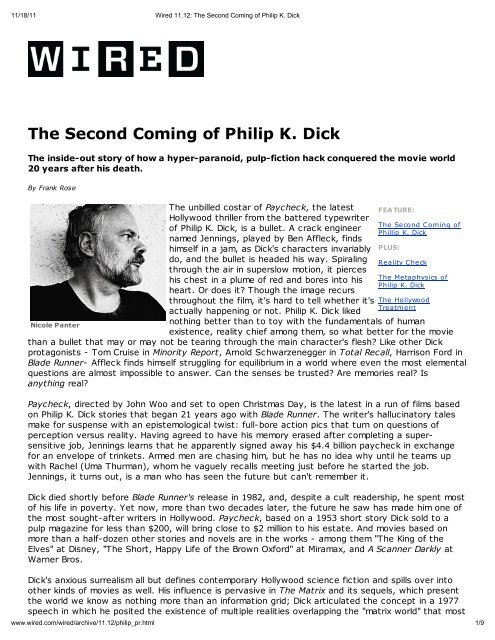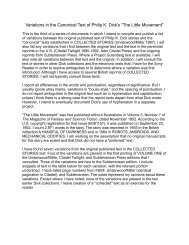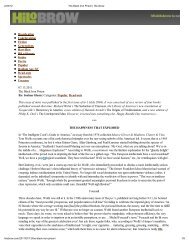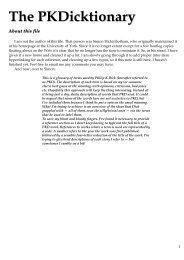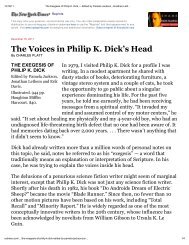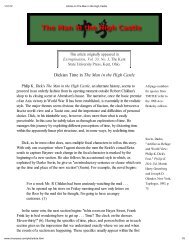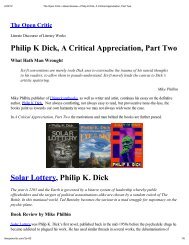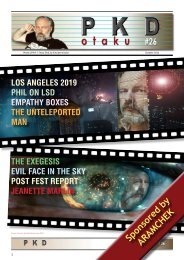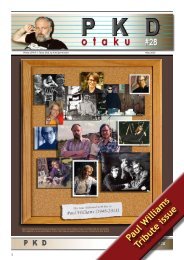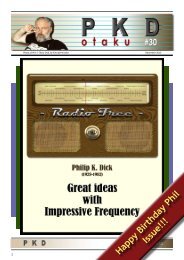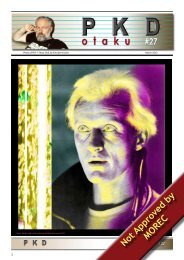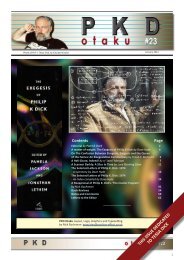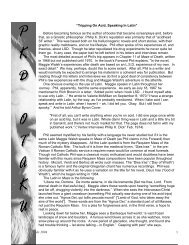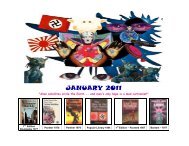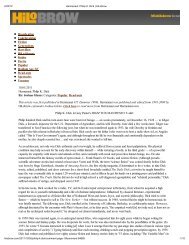The Second Coming of Philip K. Dick - Philip K. Dick Fan Site
The Second Coming of Philip K. Dick - Philip K. Dick Fan Site
The Second Coming of Philip K. Dick - Philip K. Dick Fan Site
You also want an ePaper? Increase the reach of your titles
YUMPU automatically turns print PDFs into web optimized ePapers that Google loves.
11/18/11 Wired 11.12: <strong>The</strong> <strong>Second</strong> <strong>Coming</strong> <strong>of</strong> <strong>Philip</strong> K. <strong>Dick</strong><br />
<strong>The</strong> <strong>Second</strong> <strong>Coming</strong> <strong>of</strong> <strong>Philip</strong> K. <strong>Dick</strong><br />
<strong>The</strong> inside-out story <strong>of</strong> how a hyper-paranoid, pulp-fiction hack conquered the movie world<br />
20 years after his death.<br />
By Frank Rose<br />
Nicole Panter<br />
<strong>The</strong> unbilled costar <strong>of</strong> Paycheck, the latest<br />
Hollywood thriller from the battered typewriter<br />
<strong>of</strong> <strong>Philip</strong> K. <strong>Dick</strong>, is a bullet. A crack engineer<br />
named Jennings, played by Ben Affleck, finds<br />
himself in a jam, as <strong>Dick</strong>'s characters invariably<br />
do, and the bullet is headed his way. Spiraling<br />
through the air in superslow motion, it pierces<br />
his chest in a plume <strong>of</strong> red and bores into his<br />
heart. Or does it? Though the image recurs<br />
throughout the film, it's hard to tell whether it's<br />
actually happening or not. <strong>Philip</strong> K. <strong>Dick</strong> liked<br />
FEATURE:<br />
<strong>The</strong> <strong>Second</strong> Com ing <strong>of</strong><br />
Phillip K. <strong>Dick</strong><br />
PLUS:<br />
Reality Check<br />
<strong>The</strong> Metaphysics <strong>of</strong><br />
<strong>Philip</strong> K. <strong>Dick</strong><br />
<strong>The</strong> Hollywood<br />
Treatm ent<br />
nothing better than to toy with the fundamentals <strong>of</strong> human<br />
existence, reality chief among them, so what better for the movie<br />
than a bullet that may or may not be tearing through the main character's flesh? Like other <strong>Dick</strong><br />
protagonists - Tom Cruise in Minority Report, Arnold Schwarzenegger in Total Recall, Harrison Ford in<br />
Blade Runner- Affleck finds himself struggling for equilibrium in a world where even the most elemental<br />
questions are almost impossible to answer. Can the senses be trusted? Are memories real? Is<br />
anything real?<br />
Paycheck, directed by John Woo and set to open Christmas Day, is the latest in a run <strong>of</strong> films based<br />
on <strong>Philip</strong> K. <strong>Dick</strong> stories that began 21 years ago with Blade Runner. <strong>The</strong> writer's hallucinatory tales<br />
make for suspense with an epistemological twist: full-bore action pics that turn on questions <strong>of</strong><br />
perception versus reality. Having agreed to have his memory erased after completing a supersensitive<br />
job, Jennings learns that he apparently signed away his $4.4 billion paycheck in exchange<br />
for an envelope <strong>of</strong> trinkets. Armed men are chasing him, but he has no idea why until he teams up<br />
with Rachel (Uma Thurman), whom he vaguely recalls meeting just before he started the job.<br />
Jennings, it turns out, is a man who has seen the future but can't remember it.<br />
<strong>Dick</strong> died shortly before Blade Runner's release in 1982, and, despite a cult readership, he spent most<br />
<strong>of</strong> his life in poverty. Yet now, more than two decades later, the future he saw has made him one <strong>of</strong><br />
the most sought-after writers in Hollywood. Paycheck, based on a 1953 short story <strong>Dick</strong> sold to a<br />
pulp magazine for less than $200, will bring close to $2 million to his estate. And movies based on<br />
more than a half-dozen other stories and novels are in the works - among them "<strong>The</strong> King <strong>of</strong> the<br />
Elves" at Disney, "<strong>The</strong> Short, Happy Life <strong>of</strong> the Brown Oxford" at Miramax, and A Scanner Darkly at<br />
Warner Bros.<br />
<strong>Dick</strong>'s anxious surrealism all but defines contemporary Hollywood science fiction and spills over into<br />
other kinds <strong>of</strong> movies as well. His influence is pervasive in <strong>The</strong> Matrix and its sequels, which present<br />
the world we know as nothing more than an information grid; <strong>Dick</strong> articulated the concept in a 1977<br />
speech in which he posited the existence <strong>of</strong> multiple realities overlapping the "matrix world" that most<br />
www.wired.com/wired/archive/11.12/philip_pr.html<br />
1/9
11/18/11 Wired 11.12: <strong>The</strong> <strong>Second</strong> <strong>Coming</strong> <strong>of</strong> <strong>Philip</strong> K. <strong>Dick</strong><br />
<strong>of</strong> us experience. Vanilla Sky, with its dizzying shifts between fantasy and fact, likewise ventures into<br />
a <strong>Dick</strong>ian warp zone, as does Dark City, <strong>The</strong> Thirteenth Floor, and David Cronenberg's eXistenZ.<br />
Memento reprises <strong>Dick</strong>'s memory obsession by focusing on a man whose attempts to avenge his<br />
wife's murder are complicated by his inability to remember anything. In <strong>The</strong> Truman Show, Jim Carrey<br />
discovers the life he's living is an illusion, an idea <strong>Dick</strong> developed in his 1959 novel Time Out <strong>of</strong> Joint.<br />
Next year, Carrey and Kate Winslet will play a couple who have their memories <strong>of</strong> each other erased<br />
in Eternal Sunshine <strong>of</strong> the Spotless Mind. Memory, paranoia, alternate realities: <strong>Dick</strong>'s themes are<br />
everywhere.<br />
At a time when most 20th-century science fiction writers seem hopelessly dated, <strong>Dick</strong> gives us a<br />
vision <strong>of</strong> the future that captures the feel <strong>of</strong> our time. He didn't really care about robots or space<br />
travel, though they sometimes turn up in his stories. He wrote about ordinary Joes caught in a web<br />
<strong>of</strong> corporate domination and ubiquitous electronic media, <strong>of</strong> memory implants and mood dispensers<br />
and counterfeit worlds. This strikes a nerve. "People cannot put their finger anymore on what is real<br />
and what is not real," observes Paul Verhoeven, the one-time Dutch mathematician who directed<br />
Total Recall. "What we find in <strong>Dick</strong> is an absence <strong>of</strong> truth and an ambiguous interpretation <strong>of</strong> reality.<br />
Dreams that turn out to be reality, reality that turns out to be a dream. This can only sell when<br />
people recognize it, and they can only recognize it when they see it in their own lives."<br />
Like the babbling psychics who predict future crimes in Minority Report, <strong>Dick</strong> was a precog. Lurking<br />
within his amphetamine-fueled fictions are truths that have only to be found and decoded. In a 1978<br />
essay he wrote: "We live in a society in which spurious realities are manufactured by the media, by<br />
governments, by big corporations, by religious groups, political groups. I ask, in my writing, What is<br />
real? Because unceasingly we are bombarded with pseudorealities manufactured by very<br />
sophisticated people using very sophisticated electronic mechanisms. I do not distrust their motives.<br />
I distrust their power. It is an astonishing power: that <strong>of</strong> creating whole universes, universes <strong>of</strong> the<br />
mind. I ought to know. I do the same thing."<br />
Viewed in this context, <strong>Dick</strong>'s emergence in Hollywood seems oddly inevitable. His career itself is a<br />
tale <strong>of</strong> alternate realities. In the flesh he was the ultimate outsider, pecking out paranoid visions that<br />
place the little guy at the mercy <strong>of</strong> the corporate machine. Yet posthumously he feeds the machine,<br />
his pseudoworlds the basis <strong>of</strong> ever more elaborate entertainments doled out by the megacorporations<br />
we pay to stuff our heads. How he made the leap from pulp-fiction writer to Hollywood prophet is a<br />
tale almost worthy <strong>of</strong> the man himself.<br />
<strong>Dick</strong>'s career in movies did not begin with a bang. It was 1977, and a small-time actor named Brian<br />
Kelly wanted to option the 9-year-old novel Do Androids Dream <strong>of</strong> Electric Sheep? For a mere<br />
$2,500, he got it. "<strong>The</strong> works <strong>of</strong> <strong>Philip</strong> K. <strong>Dick</strong> were not exactly in demand," recalls the writer's New<br />
York literary agent, Russell Galen, "and for Phil" - then 49 and living in suburban Orange County -<br />
"that was enough to make the difference between a good year and a bad year." Kelly's partner wrote<br />
a screenplay and shopped it around. Eventually it landed on the desk <strong>of</strong> Ridley Scott, who'd just<br />
directed Alien. Scott brought in a new writer and sent it to Alan Ladd Jr., one <strong>of</strong> the top players in<br />
Hollywood.<br />
"I liked the project," says Ladd, a quiet, deliberate man whose Beverly Hills<br />
<strong>of</strong>fices are lined with posters for the films he's made: Star Wars, <strong>The</strong> Right<br />
Stuff, Chariots <strong>of</strong> Fire, Braveheart "It was a good old-fashioned detective story<br />
set in the future." Ladd thought Harrison Ford, who'd costarred in Star Wars,<br />
would be good as a Humphrey Bogart-type sleuth. Blade Runner was a go.<br />
Just a few months before the movie's release, <strong>Dick</strong> suffered a massive stroke.<br />
Blade Runner proved only a modest success at the box <strong>of</strong>fice; if not for two<br />
other developments, <strong>Dick</strong>'s career might have died with him. <strong>The</strong> first was the<br />
emergence <strong>of</strong> home video, which gave new life to small films with cult<br />
followings. Throughout the '80s, Blade Runner's reputation as a noirishly<br />
FEATURE:<br />
<strong>The</strong> <strong>Second</strong> Com ing <strong>of</strong><br />
Phillip K. <strong>Dick</strong><br />
PLUS:<br />
Reality Check<br />
<strong>The</strong> Metaphysics <strong>of</strong><br />
<strong>Philip</strong> K. <strong>Dick</strong><br />
<strong>The</strong> Hollywood<br />
Treatm ent<br />
futuristic gem continued to build. <strong>The</strong> second was the interest <strong>of</strong> Ron Shusett, a screenwriter who'd<br />
worked on Alien. Before <strong>Dick</strong> died, Shusett bought the film rights to "We Can Remember It for You<br />
www.wired.com/wired/archive/11.12/philip_pr.html<br />
2/9
11/18/11 Wired 11.12: <strong>The</strong> <strong>Second</strong> <strong>Coming</strong> <strong>of</strong> <strong>Philip</strong> K. <strong>Dick</strong><br />
Wholesale," a story about a nebbishy clerk with dreams <strong>of</strong> going to Mars. He retitled it Total Recall<br />
and took it to Dino De Laurentiis, who put it into development.<br />
Total Recall languished for years before all the elements - producer, director, star - came together.<br />
At one point, Richard Dreyfuss was attached. At another, David Cronenberg was going to direct and<br />
wanted William Hurt for the lead. "I worked on it for a year and did about 12 drafts," Cronenberg<br />
recalls. "Eventually we got to a point where Ron Shusett said, 'You know what you've done? You've<br />
done the <strong>Philip</strong> K. <strong>Dick</strong> version.' I said, 'Isn't that what we're supposed to be doing?' He said, 'No, no,<br />
we want to do Raiders <strong>of</strong> the Lost Ark Go to Mars.'" Cronenberg moved on. Arnold Schwarzenegger<br />
wanted to star, but De Laurentiis refused: Even in an overamped Hollywood bastardization, he<br />
couldn't see Schwarzenegger in the part. Instead, it went to Patrick Swayze, with Bruce Beresford<br />
directing. <strong>The</strong>y were building sets in Australia when De Laurentiis' company went bankrupt.<br />
This gave Schwarzenegger his chance. He got Carolco, the high-flying mini-studio behind the Rambo<br />
series, to buy the property, and Paul Verhoeven to direct it. <strong>The</strong> henpecked clerk named Quail<br />
became a muscle-bound construction worker named Quaid, and a new ending was written to make up<br />
for what many filmmakers see as the problem with <strong>Dick</strong>'s short stories: their lack <strong>of</strong> a third act that<br />
will take a movie to 90 minutes or more. But while Verhoeven's film was an interplanetary shoot-'emup<br />
that bore little resemblance to <strong>Dick</strong>'s story, it did retain the tale's essential ambiguity: At the end,<br />
we're not sure whether the main character actually went to Mars or only thought he did, thanks to<br />
some memory implants he bought. "This was extremely innovative, coming from a Hollywood studio,"<br />
says Verhoeven. "To dare to say, Everything you see could be a dream, or everything you see could<br />
be reality, and we won't tell you which is true - I thought that was pretty sensational."<br />
Total Recall was one <strong>of</strong> the biggest hits <strong>of</strong> 1990, grossing $118 million in the US alone. That was<br />
good for Carolco, even better for <strong>Dick</strong>. "<strong>The</strong> whole phenomenon <strong>of</strong> <strong>Philip</strong> K. <strong>Dick</strong> short stories selling<br />
for a lot <strong>of</strong> money started with Total Recall," says Russell Galen, the literary agent, who now<br />
represents his estate. Before Total Recall, <strong>Dick</strong> was a Hollywood unknown; afterward, screenwriters<br />
and producers saw his stories as properties they could build action movies around. And there were<br />
dozens <strong>of</strong> these properties - 36 novels and more than 150 short stories, most as-yet unoptioned.<br />
It would be a while before anything was available. <strong>Dick</strong> had died without a will, and his estate was in<br />
probate for 11 years. When it was finally settled, however, Galen had work to do. Warner Bros.<br />
bought the novel Time Out <strong>of</strong> Jointfor Joel Silver (who went on to produce the Matrix series) and<br />
optioned A Scanner Darkly for George Clooney and Steven Soderbergh's production company, Section<br />
8. <strong>The</strong> Jim Henson Company optioned "<strong>The</strong> King <strong>of</strong> the Elves" and set it up as a children's film at<br />
Disney. Spyglass Entertainment, makers <strong>of</strong> M. Night Shyamalan's <strong>The</strong> Sixth Sense, took an option on<br />
"Paycheck." Business got so heavy that Galen had to devise a computerized chart showing what's<br />
available, what's been optioned and will become available in the future, and what's been sold<br />
outright.<br />
One <strong>of</strong> the first to go was "<strong>The</strong> Minority Report," a short story published in the January '56 issue <strong>of</strong><br />
<strong>Fan</strong>tastic Universe, about a police commander who uses clairvoyants to arrest people before they<br />
actually commit a crime. Gary Goldman, the screenwriter who'd reworked Total Recall for Verhoeven,<br />
brought it to the director, who decided it would make a great sequel. This was a story in which <strong>Dick</strong>'s<br />
obsession with alternate realities dovetailed with a fascination with fate: If we can see into the<br />
future, does that mean the future is set? That humans have no capacity for free will? Verhoeven<br />
envisioned Total Recall II: <strong>The</strong> Minority Report as a whiz-bang, action-packed, "theologicalphilosophical<br />
challenge" to the Calvinist concept <strong>of</strong> predestination. But Carolco went bankrupt before<br />
he could make it. So Goldman took it to director Jan de Bont, Verhoeven's former cinematographer,<br />
who showed it to Tom Cruise, who'd been thinking for some time about doing a science fiction picture<br />
with Steven Spielberg.<br />
To Galen, the 1998 announcement that Cruise and Spielberg would team up to make Minority Report<br />
was electrifying. Three years passed before they actually got to it, and when they did the movie<br />
departed significantly from the short story, which was a paranoia-soaked potboiler in which the<br />
police commander in charge <strong>of</strong> "pre-crime" is framed by his new deputy, or his wife, or an ex-general,<br />
www.wired.com/wired/archive/11.12/philip_pr.html<br />
3/9
11/18/11 Wired 11.12: <strong>The</strong> <strong>Second</strong> <strong>Coming</strong> <strong>of</strong> <strong>Philip</strong> K. <strong>Dick</strong><br />
or all or none <strong>of</strong> the above. "I don't think Phil was all that interested in the morality <strong>of</strong> pre-crime,"<br />
says Goldman, an executive producer <strong>of</strong> the film. But Spielberg was, and the movie ends with a<br />
ringing endorsement <strong>of</strong> the American justice system. "It's very difficult to be true to Phil <strong>Dick</strong> and<br />
make a Hollywood movie," Goldman observes. "His thinking was subversive. He questioned everything<br />
Hollywood wanted to affirm." No matter. With the release <strong>of</strong> Minority Report, <strong>Dick</strong> became an A-list<br />
Hollywood scribe, a player, a member <strong>of</strong> the club.<br />
Art Sreiber<br />
Paycheck director John Woo made<br />
his name with violent ballets <strong>of</strong><br />
bullets; his new inspiration:<br />
Hitchcock.<br />
Vancouver, June 2003. <strong>The</strong> Paycheck shoot<br />
is well under way, and this morning Woo is<br />
rehearsing one <strong>of</strong> the opening scenes. A vast<br />
soundstage on the edge <strong>of</strong> town has been<br />
converted into the headquarters <strong>of</strong> Allcom, a<br />
company that seems to be an unholy marriage<br />
<strong>of</strong> Micros<strong>of</strong>t, Monsanto, and GE. On one side <strong>of</strong><br />
the soundstage is the bio lab, a rainforest <strong>of</strong><br />
orchids and bromeliads and water lilies and<br />
trees reaching up to the ceiling, interspersed<br />
with catwalks and robot arms. This is Uma's<br />
FEATURE:<br />
<strong>The</strong> <strong>Second</strong> Com ing <strong>of</strong><br />
Phillip K. <strong>Dick</strong><br />
PLUS:<br />
Reality Check<br />
<strong>The</strong> Metaphysics <strong>of</strong><br />
<strong>Philip</strong> K. <strong>Dick</strong><br />
<strong>The</strong> Hollywood<br />
Treatm ent<br />
domain. On the other side, behind an enormous door, is the<br />
computer lab Ben is about to disappear into. When he emerges,<br />
three years later, it will be with his memory wiped. But on his way<br />
in, he captures Uma's attention. Mischievously, she hits him with a<br />
blast <strong>of</strong> air almost strong enough to bowl him over. "I give up! I give<br />
up!" he cries, slicking back his hair. In a flash a robot arm swings in<br />
front <strong>of</strong> him, halting an inch or two from his face. In its pincers, a<br />
yellow orchid.<br />
"Don't give up," Uma says s<strong>of</strong>tly.<br />
<strong>The</strong>re are plenty <strong>of</strong> action sequences in Paycheck- a motorcycle chase through the streets <strong>of</strong><br />
Vancouver, a climactic fight scene replete with explosions, gunfire, and people diving through the air.<br />
But for Woo, that's not the point. Woo made his name in Hong Kong in the '80s with hyperviolent cult<br />
films like A Better Tomorrow and <strong>The</strong> Killer- maximum spatter rendered with balletic grace.<br />
Transplanted to Hollywood in the '90s, he graduated to big-budget action-adventure tales, most<br />
notably Face Off and Mission: Impossible 2, the second-highest-grossing film <strong>of</strong> 2000. But like other<br />
genre directors, he dreams <strong>of</strong> greater things. "Paycheck is a suspenseful movie, but also it is a love<br />
story," he says in heavily accented English while the crew preps the next shot. "Usually, science<br />
fiction movies are pretty cold. I am trying to make this one more human. Some <strong>of</strong> the scenes are a<br />
tribute to" - he claps a hand over his mouth, pretending he's afraid to utter the word - "Hitchcock."<br />
Paramount<br />
Woo cites Hitchcock - along with '30s musicals, Francis Ford<br />
Coppola, and the blood-soaked Westerns <strong>of</strong> Sam Peckinpah - as a<br />
major influence. "Hitchcock's movies are so precise," he says<br />
admiringly. "Every shot is calculated. And they're not only about<br />
suspense - I also find them very romantic." He mentions the scene<br />
in <strong>The</strong> Birds when Tippi Hedren is driving to meet Rod Taylor, a pair<br />
<strong>of</strong> lovebirds in a cage on the floor: <strong>The</strong>re are lovebirds in Paycheck,<br />
too. He mentions the scene in North by Northwest when Cary Grant<br />
is chased by a crop duster in an Indiana cornfield: In Paycheck,<br />
Affleck is chased by a train. "Ben plays an ordinary man, not a<br />
superhero," Woo says. "Just like a young Cary Grant - that's how I<br />
want him to be."<br />
"This is a part I went after really aggressively," says Affleck. "I've<br />
always been a fan <strong>of</strong> <strong>Philip</strong> K. <strong>Dick</strong>, both his writings and the movie<br />
adaptations. <strong>The</strong>y're big-budget movies for smart people." Too<br />
<strong>of</strong>ten, Affleck admits, that's an oxymoron: "<strong>The</strong>re's a tendency to<br />
www.wired.com/wired/archive/11.12/philip_pr.html<br />
4/9
11/18/11 Wired 11.12: <strong>The</strong> <strong>Second</strong> <strong>Coming</strong> <strong>of</strong> <strong>Philip</strong> K. <strong>Dick</strong><br />
dumb these movies down - they're spending so much money on<br />
them, and conventional wisdom dictates that you have to go for the<br />
lowest common denominator. But his ideas prevent that. To anybody<br />
who's ever thought, Did that happen or did I dream it? - you'd have<br />
to have a PhD in philosophy to get too deep into this, but it has to<br />
do with wanting to validate our own first-person experience."<br />
Paramount<br />
Paycheck stars Uma Thurman and<br />
Ben Affleck.<br />
Just as Spielberg was dismissed by hardcore <strong>Dick</strong> fans, Woo strikes<br />
many as unworthy. <strong>The</strong>y probably don't realize that the Matrixseries<br />
contains almost as many references to Woo as to <strong>Dick</strong>. (Fluttering<br />
pigeons heralding a fight, a shooter with two guns blazing - pure<br />
Woo.) And though he makes exceptions for Star Wars and<br />
Spielberg's Close Encounters <strong>of</strong> the Third Kind, Woo thinks most<br />
science fiction is limited in scope.<br />
But then, so did <strong>Dick</strong>. In response to a 1969 questionnaire, <strong>Dick</strong> described SF's greatest weakness as<br />
"its inability to explore the subtle, intricate relationships that exist between the sexes," adding that<br />
as a result it "remains pre-adult, and therefore appeals - more or less - to pre-adults." <strong>The</strong> malefemale<br />
relationships in <strong>Dick</strong>'s work tend to be more dysfunctional than romantic, but the idea <strong>of</strong> Woo<br />
interpreting <strong>Dick</strong> through Hitchcock makes sense: <strong>The</strong>se are three genre artists who've transcended<br />
their category. Certainly if Hitch had tackled science fiction, his trademark combination <strong>of</strong> paranoia<br />
and suspense would have fit <strong>Dick</strong> perfectly.<br />
<strong>Philip</strong> K. <strong>Dick</strong> appeals to Woo, and to studio execs as well, because the humans take precedence<br />
over the science fiction elements <strong>of</strong> his stories - the robots, the gizmos, the spaceships that<br />
transport you to Mars. <strong>The</strong> ideas are a bonus, though in "Paycheck" and other early pulp-fiction<br />
stories, they're not always well developed. "One thing he didn't go into," observes Dean Georgaris,<br />
who wrote the Paycheckscreenplay, "is what kind <strong>of</strong> person would agree to have a large portion <strong>of</strong><br />
his memory erased. For me, that was the key that opened the door to the movie. It's about what's<br />
important in life - is it the great moments, or the little things that add up?" But the big question <strong>Dick</strong><br />
only hinted at was what people would do if they had the machine Jennings built before his mind was<br />
wiped - a machine whose nature only gradually becomes apparent in the movie. "Would we become<br />
addicted to it, like we've become addicted to TV?" Georgaris wonders. Movies like <strong>The</strong> Terminator<br />
and <strong>The</strong> Matrix are about machines that attack humans. <strong>The</strong> more likely scenario, Georgaris thinks, is<br />
that humans will submit voluntarily.<br />
It may be for the best that <strong>Dick</strong>'s career in Hollywood took <strong>of</strong>f only after his death, because he'd<br />
certainly have had a hard time handling it in life. Psychologically, the guy was a mess. His fear <strong>of</strong><br />
going out in public was so bad it's difficult to imagine him taking a meeting at a film studio. According<br />
to Isa <strong>Dick</strong>-Hackett, one <strong>of</strong> three children he produced in five marriages, he couldn't even make good<br />
on a promise to take her to Disneyland when she was little. "Twenty or thirty minutes into it, he<br />
started to complain <strong>of</strong> back pain and had to leave," she says. "Later, I realized the crowds just<br />
freaked him out."<br />
<strong>The</strong> <strong>Philip</strong> K. <strong>Dick</strong> estate has no such problems. Isa and her older half-sister,<br />
Laura Leslie, are upstanding Bay Area citizens, both intelligent and obviously<br />
competent. Together with their younger half-brother, Chris, who works as a<br />
martial arts instructor in Southern California, they control their father's legacy.<br />
Russell Galen advises them from New York. <strong>The</strong> four take their stewardship<br />
seriously: <strong>The</strong>y're fine with repackaging a novel to tie in with a movie, for<br />
example, but novelizations <strong>of</strong> short stories are out. And thanks to Vintage<br />
Books, every word <strong>of</strong> his fiction will soon be in print - as you'd expect for an<br />
author who's now taught in colleges and cited by the French post-structuralist<br />
philosopher Jean Baudrillard.<br />
FEATURE:<br />
<strong>The</strong> <strong>Second</strong> Com ing <strong>of</strong><br />
Phillip K. <strong>Dick</strong><br />
PLUS:<br />
Reality Check<br />
<strong>The</strong> Metaphysics <strong>of</strong><br />
<strong>Philip</strong> K. <strong>Dick</strong><br />
<strong>The</strong> Hollywood<br />
Treatm ent<br />
As for film deals, the estate has become increasingly choosy. "We sort <strong>of</strong> feel like we have to protect<br />
<strong>Philip</strong> K. <strong>Dick</strong>'s brand image," says Galen. "So we set very, very high prices, and we'll only do business<br />
www.wired.com/wired/archive/11.12/philip_pr.html<br />
5/9
11/18/11 Wired 11.12: <strong>The</strong> <strong>Second</strong> <strong>Coming</strong> <strong>of</strong> <strong>Philip</strong> K. <strong>Dick</strong><br />
with people who are established. It's ironic, because the films that created the phenomenon started<br />
with options that were granted to struggling filmmakers. Today, we shun people like that." Not every<br />
movie based on <strong>Dick</strong>'s writings has been a hit: <strong>The</strong> 1996 film Screamers, starring Peter Weller, and<br />
last year's Imposter, with Gary Sinise in the lead, grossed only $12 million between them. "But in<br />
Hollywood, what matters is getting the movie made," explains Galen. "If somebody options a story<br />
and it's not made, that spoils the track record."<br />
Still, most Hollywood writers, even successful ones, live mainly <strong>of</strong>f properties that are sold but not<br />
developed, and the <strong>Dick</strong> estate is no exception. Of the more than half-dozen film projects currently<br />
in the works, some are inching forward while others are caught in limbo. John Alan Simon, who<br />
produced <strong>The</strong> Getaway with Alec Baldwin and Kim Basinger, and his partner, Dale Rosenbloom, are<br />
trying to get studio backing for films based on three <strong>Dick</strong> novels - Radio Free Albemuth, Valis, and<br />
Flow My Tears, the Policeman Said. Miramax has a script and is looking for a director for "<strong>The</strong> Short<br />
Happy Life <strong>of</strong> the Brown Oxford," a story about a shoe that comes alive. ("With the right actor and<br />
the right filmmaker, it will be memorable," says development exec Michael Zoumas. "Without them it<br />
will be, what were they thinking?") Both Joel Silver's Time Out <strong>of</strong> Joint and Steven Soderbergh's A<br />
Scanner Darkly are idling while the producers work on other projects. As Galen puts it, "To have<br />
Minority Report and Paycheck back-to-back like that" - big-budget films with big-name stars and a<br />
top director - "requires an incredible planetary alignment."<br />
<strong>Dick</strong>'s kids grew up poor - no health insurance, clothes from Goodwill. Laura recalls how grateful she<br />
was to get braces. But the hard-scrabble life was critical to <strong>Dick</strong>'s sensibility. "Phil's work came out<br />
<strong>of</strong> an atmosphere <strong>of</strong> want and struggle," Galen observes. Science fiction was a ghetto in the '50s<br />
and '60s, and <strong>Dick</strong> was one <strong>of</strong> its least fashionable residents: While Isaac Asimov and Arthur C.<br />
Clarke were writing best sellers, he counted himself lucky not to be collecting rejection slips. "From<br />
the day he wrote his first story, he was worried would he ever get another sale," Galen says.<br />
"Certainly he was as prolific as he was because he needed money. We have 30-odd <strong>Philip</strong> K. <strong>Dick</strong><br />
novels and not 10 because he was not that well paid."<br />
How celebrity would have affected him is a different question. "He would never have been that<br />
Hollywood thing, ever," says Laura, sitting with Isa on the patio <strong>of</strong> Spago in Palo Alto. <strong>The</strong> closest he<br />
came was buying a sports car, shortly before he died. But he was afraid to drive it, and apparently<br />
with good reason: "6,000 miles, and it had dents all over it," Laura observes. In most ways, they<br />
agree, he wouldn't have changed. He wouldn't have gotten health insurance. Instead <strong>of</strong> filing his<br />
income taxes, he'd have continued to claim he was handing everything over to "Mrs. Frye" at the<br />
IRS. (As far as the daughters know, Mrs. Frye never existed.) This is a guy who had to have a friend<br />
take Isa to the toy store because he couldn't handle the anxiety. "<strong>The</strong> thought <strong>of</strong> the general public<br />
knowing who he was," she says now - "he would have been out <strong>of</strong> his mind."<br />
As things turned out, he never had to worry about it. Instead, it's Laura and Isa who deal with his<br />
fame. <strong>The</strong> two daughters had quite different upbringings, and as primary guardians <strong>of</strong> the estate<br />
they play equally divergent roles. Laura, trim and proper and blond, saw her father only four times<br />
after the age <strong>of</strong> 3, but she read all his books when she was 12, and the two corresponded and talked<br />
on the phone constantly. Today she shuns publicity and focuses on the deals. Isa was brought up in<br />
a fundamentalist Christian home; every book her father sent was burned because it contained swear<br />
words. Outgoing and enthusiastic, with dark curls cascading almost to her shoulders, she likes to<br />
reach out to the fans. Now, for example, she's working with Jason Koornick, who runs the fan site<br />
<strong>Philip</strong>K<strong>Dick</strong>.com, to convert it into an <strong>of</strong>ficial one - a place where they can post unpublished letters<br />
and other documents.<br />
Neither <strong>of</strong> the daughters was prepared for the Spielberg effect. "<strong>The</strong> whole Minority Report thing<br />
blew us away," says Laura. "It was so unexpected" - the hubbub <strong>of</strong> the New York premiere, the<br />
glamorous party at Cipriani, the effusive praise from stars like Tom Cruise and Colin Farrell. "We didn't<br />
realize what a phenomenon our dad was."<br />
"He's a question on Jeopardy," Isa interjects.<br />
www.wired.com/wired/archive/11.12/philip_pr.html<br />
6/9
11/18/11 Wired 11.12: <strong>The</strong> <strong>Second</strong> <strong>Coming</strong> <strong>of</strong> <strong>Philip</strong> K. <strong>Dick</strong><br />
Laura recalls a Dean Koontz story that contains a remark about "having a <strong>Philip</strong> K. <strong>Dick</strong> moment." She<br />
finds the notion a little unsettling: Her world was full <strong>of</strong> <strong>Philip</strong> K. <strong>Dick</strong> moments. "That was just my<br />
dad," she says. "<strong>The</strong> concept <strong>of</strong> alternate realities - I thought that was the way everybody talked."<br />
In his 1974 novel Flow My Tears, the Policeman Said, <strong>Dick</strong> wrote about the sudden shift experienced<br />
by Jason Taverner, a world-famous talk-show host who wakes up one morning to find that no one<br />
has heard <strong>of</strong> him and no record <strong>of</strong> his identity exists. <strong>Dick</strong>'s own experience <strong>of</strong> celebrity is almost the<br />
reverse: For decades, no one outside the science fiction ghetto had heard <strong>of</strong> him, and now he's<br />
world-famous, the kind <strong>of</strong> guy Tom Cruise and Steven Spielberg talk about on Oprah. All this fame<br />
came at the stage in life when he was best able to handle it - after he was dead. "I feel so happy for<br />
him," Isa declares. "He was so afraid <strong>of</strong> death - and how amazing for him."<br />
"He's going to live forever," says Laura, continuing Isa's thought.<br />
"Every day, more and more people know him."<br />
"He transcended death," Laura says, a note <strong>of</strong> wonder in her voice - half awe, half bemusement. As<br />
if to say: How very <strong>Philip</strong> K. <strong>Dick</strong>.<br />
Reality Check<br />
Uma Thurman on the surreal world <strong>of</strong> <strong>Dick</strong>, karmic paybacks, and working with mind-bending<br />
auteurs.<br />
by Frank Rose<br />
"It's all very Buddhist," says Uma Thurman, sitting in a dressing room as a<br />
makeup artist dabs at her face.<br />
She means <strong>Philip</strong> K. <strong>Dick</strong>, <strong>of</strong> course. Her father,<br />
Columbia University pr<strong>of</strong>essor Robert Thurman,<br />
is a leading Buddhist scholar and a good friend<br />
<strong>of</strong> the Dalai Lama, so she's no stranger to<br />
discussions <strong>of</strong> memory and reality. "Reality is<br />
an illusion - that's the principle <strong>of</strong> ancient<br />
Buddhist thought," she continues. "And the<br />
basic idea <strong>of</strong> being reborn is that you erase the<br />
FEATURE:<br />
<strong>The</strong> <strong>Second</strong> Com ing <strong>of</strong><br />
Phillip K. <strong>Dick</strong><br />
PLUS:<br />
Reality Check<br />
<strong>The</strong> Metaphysics <strong>of</strong><br />
<strong>Philip</strong> K. <strong>Dick</strong><br />
<strong>The</strong> Hollywood<br />
Treatm ent<br />
memory. Everybody is interconnected, and you're working out your<br />
karma with people - so you get erased, but all work left undone has<br />
to be completed."<br />
So Thurman is a fan. Blade Runner was one <strong>of</strong> her favorite movies<br />
growing up - the plight <strong>of</strong> the replicants was so affecting it made<br />
her cry - and after seeing it she read <strong>Dick</strong>'s novel. "<strong>The</strong>re's<br />
something very earthly in his imaginings," she says. "You don't have<br />
to set them on Mars - they're projections from here on Earth.<br />
<strong>The</strong>re's class struggle, there's government deceit. And these<br />
Frank Ockenfels<br />
nightmarish fantasies about corporations owning the world - I mean,<br />
obviously there's a reason people relate to that."<br />
Thurman was coming <strong>of</strong>f a grueling 11-month shoot in China for Quentin Tarantino's Kill Bill when she<br />
received the <strong>of</strong>fer to costar in Paycheck. "I never get asked to be 'the girl,'" she says, "so I was sort<br />
<strong>of</strong> thrilled to just be the sidekick in a romantic context, instead <strong>of</strong> the man/woman/fighter/stuntdouble/<br />
you-name-it. I thought that would be nice - to not be the one covered in blood." She also<br />
wanted the chance to work with John Woo, whose Hong Kong films Tarantino had reverentially<br />
screened for her.<br />
"I was completely blown away," she says. "I've always been drawn to directors who have a real<br />
www.wired.com/wired/archive/11.12/philip_pr.html<br />
7/9
11/18/11 Wired 11.12: <strong>The</strong> <strong>Second</strong> <strong>Coming</strong> <strong>of</strong> <strong>Philip</strong> K. <strong>Dick</strong><br />
voice." She was 17 when Terry Gilliam cast her in <strong>The</strong> Adventures <strong>of</strong> Baron Munchausen. After that<br />
came, among others, Stephen Frears' Dangerous Liaisons, Gus Van Sant's Even Cowgirls Get the<br />
Blues, Tarantino's Pulp Fiction, Andrew Niccol's Gattaca, and James Ivory's <strong>The</strong> Golden Bowl. "It's<br />
special, being in front <strong>of</strong> those cameras. It doesn't mean the movie's going to work, but I'd rather err<br />
with that kind <strong>of</strong> director. <strong>The</strong>y've each created their own world, many times over."<br />
<strong>The</strong> Metaphysics <strong>of</strong> <strong>Philip</strong> K. <strong>Dick</strong><br />
Don't know <strong>Dick</strong>? Here's his philosophy in capsule form. (Warning: May cause anxiety or<br />
dizzyness.)<br />
by Erik Davis<br />
1. FALSE REALITIES<br />
Today we are almost bored by the idea that reality is a just a construct -<br />
neuroscience, postmodernism, and <strong>The</strong> Matrix have made sure <strong>of</strong> that. But <strong>Dick</strong><br />
remains the supreme mythmaker <strong>of</strong> the false reality. His 1959 novel, Time Out <strong>of</strong><br />
Joint, was the original Truman Show, while his 1964 book, <strong>The</strong> Three Stigmata<br />
<strong>of</strong> Palmer Eldritch, describes a society that succumbs to permanent<br />
hallucination. Faced with such illusions, <strong>Dick</strong>'s characters have to ask, "What is<br />
real?" because their lives (and sanity) are on the line. That's why hipster<br />
Hollywood loves him: <strong>Dick</strong> turned metaphysics into a whodunit.<br />
FEATURE:<br />
<strong>The</strong> <strong>Second</strong> Com ing <strong>of</strong><br />
Phillip K. <strong>Dick</strong><br />
PLUS:<br />
Reality Check<br />
<strong>The</strong> Metaphysics <strong>of</strong><br />
<strong>Philip</strong> K. <strong>Dick</strong><br />
<strong>The</strong> Hollywood<br />
Treatm ent<br />
2. HUMAN VS. MACHINE<br />
<strong>Dick</strong> wanted to know how, in a technological society, we can recognize the authentically human. He<br />
saw the line between people and machines become hopelessly blurred. So his human characters<br />
<strong>of</strong>ten behave like cruel robots, while spunky gadgets - like the automatic cabbie in Now Wait for Last<br />
Year - can be sources <strong>of</strong> wisdom and kindness. And in "<strong>The</strong> Electric Ant," when businessman Garson<br />
Poole discovers that he is actually an android, he doesn't despair. Instead, he begins to reprogram<br />
himself.<br />
3. ENTROPY<br />
One thing you learn from drug addiction, five marriages, and a visionary imagination is how easily your<br />
world can fall apart. Perhaps this was why <strong>Dick</strong> was obsessed with how things decay. He even<br />
invented a word for one <strong>of</strong> entropy's most ordinary manifestations: "kipple," which he defined as all<br />
the useless crap that creeps into our daily lives, like junk mail and gum wrappers and old newspapers.<br />
Don't bother fighting it - <strong>Dick</strong>'s First Law <strong>of</strong> Kipple states that "Kipple drives out nonkipple."<br />
4. THE NATURE OF GOD<br />
<strong>Dick</strong> was a garage philosopher, an autodidact who read voraciously in religion and metaphysics.<br />
Sometimes his speculations leaked into everyday life. In 1974, undergoing a psychotic and/or<br />
mystical break, <strong>Dick</strong> encountered a cosmic force he later called Valis, which stands for Vast Active<br />
Living Intelligence System - a cybernetic God. But keep on your toes: To sneak into our fallen world,<br />
Valis must disguise itself as TV ads or trash - or pulpy sci-fi entertainment.<br />
5. SOCIAL CONTROL<br />
<strong>Dick</strong> was always pretty paranoid. But when thieves broke into his home in 1971, it sent him over the<br />
edge. Soon he came to believe that all political tyrannies were facets <strong>of</strong> one cosmic oppressor: the<br />
Black Iron Prison, a timeless archetype that he associated with the Roman Empire. <strong>Dick</strong> sometimes<br />
thought that history was an illusion and that the Nixon administration's dirty tricks only proved that<br />
"<strong>The</strong> Empire never ended." One wonders what he would think today.<br />
<strong>The</strong> Hollywood Treatment<br />
Why do filmmakers love <strong>Philip</strong> K. <strong>Dick</strong>? Credit his mix <strong>of</strong> head-spinning<br />
imagination and high-concept action - not to mention big fans like Tom<br />
Cruise. Of course, <strong>Dick</strong>'s paycheck was a bit smaller. Here's a breakdown<br />
<strong>of</strong> PKD movies so far:<br />
FEATURE:<br />
<strong>The</strong> <strong>Second</strong> Com ing <strong>of</strong><br />
Phillip K. <strong>Dick</strong><br />
PLUS:<br />
Reality Check<br />
www.wired.com/wired/archive/11.12/philip_pr.html<br />
8/9
11/18/11 Wired 11.12: <strong>The</strong> <strong>Second</strong> <strong>Coming</strong> <strong>of</strong> <strong>Philip</strong> K. <strong>Dick</strong><br />
<strong>The</strong>Metaphysics<strong>of</strong><br />
<strong>Philip</strong>K.<strong>Dick</strong><br />
<strong>The</strong>Holywood<br />
Treatment<br />
BLADE<br />
RUNNER<br />
(1982)<br />
TOTAL RECALL<br />
(1990)<br />
SCREAMERS<br />
(1996)<br />
IMPOSTOR<br />
(2002)<br />
MINORITY<br />
REPORT<br />
(2002)<br />
PAYCHECK<br />
(2003)<br />
PLOT<br />
Abounty<br />
hunter<br />
chases<br />
downand<br />
kils<br />
remarkably<br />
human<br />
androids,<br />
then<br />
beginsto<br />
suspecthe<br />
mightbe<br />
one<br />
himself.<br />
Amantriesto<br />
takeavirtual<br />
vacationon<br />
Mars,onlyto<br />
learnhe s<br />
actualya<br />
secretagent<br />
fightingabrutal<br />
dictatorship<br />
there.<br />
Anarmy<br />
commander<br />
onadistant<br />
planet<br />
batles<br />
androidsthat<br />
canbe<br />
distinguished<br />
from<br />
humansonly<br />
bytheir<br />
screams.<br />
Ascientist<br />
whohas<br />
developed<br />
kiler<br />
androidsis<br />
arested<br />
and<br />
charged<br />
withbeing<br />
one.<br />
Apolice<br />
<strong>of</strong>ficerina<br />
unitthat<br />
captures<br />
murderers<br />
before<br />
theystrike<br />
isthen<br />
accused<strong>of</strong><br />
afuture<br />
crime<br />
himself.<br />
An<br />
engineer<br />
whose<br />
memoryis<br />
erased<br />
racesto<br />
findout<br />
whyhe<br />
tradeda<br />
huge<br />
paydayfor<br />
seemingly<br />
useless<br />
trinkets.<br />
DIRECTOR<br />
Ridley<br />
Scott<br />
PaulVerhoeven<br />
Christian<br />
Duguay<br />
Gary<br />
Fleder<br />
Steven<br />
Spielberg<br />
JohnWoo<br />
STAR<br />
Harison<br />
Ford<br />
Arnold<br />
Tom<br />
PeterWeler GarySinise<br />
Schwarzenegger Cruise<br />
BenAfleck<br />
GROSS<br />
(US)<br />
$28milion $119milion $6milion $6milion $132<br />
milion<br />
opens<br />
December<br />
25<br />
BASED ON<br />
Do<br />
Androids<br />
Dream <strong>of</strong><br />
Electric<br />
Sheep?<br />
(1968)<br />
"WeCan<br />
RememberIt<br />
forYou<br />
Wholesale"<br />
(1966)<br />
"<strong>Second</strong><br />
Variety"<br />
(1953)<br />
"Impostor"<br />
(1953)<br />
"<strong>The</strong><br />
Minority<br />
Report"<br />
(1956)<br />
"Paycheck"<br />
(1953)<br />
WHAT<br />
DICK GOT<br />
PAID<br />
$1,250 NA $375 $75 $130 $195<br />
Copyright © 1993-2004 <strong>The</strong> Condé Nast Publications Inc. All rights reserved.<br />
Copyright © 1994-2003 Wired Digital, Inc. All rights reserved.<br />
www.wired.com/wired/archive/11.12/philip_pr.html<br />
9/9


